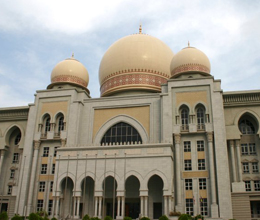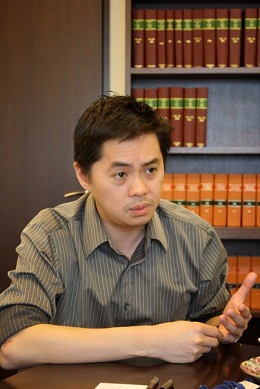FMT’s interview with Edmund Bon continues. This time he bites the Judiciary. He discusses the compromise in standards in the name of tackling inefficiencies and the public’s perception that the Judiciary is not independent.
‘Clean up the Judiciary first’
By Teoh El Sen

FMT KUALA LUMPUR: The Malaysian judiciary needs to improve to restore the people’s confidence in the courts, said lawyer-activist Edmund Bon.
Bon said that until today, the perception that the judiciary is “executive-compliant” still remains.
“When people have no faith in the courts, then confidence in seeking a fair remedy will be at an all-time low,” said the Bar Council member and chairman of the constitutional law committee.
Bon admitted there are some “very, very good judges” but said he felt depressed that some do not get recognised or promoted because of their independence.
Asked what should be done, Bon said the judiciary first needed an internal clean-up following the findings and recommendations of the Royal Commission of Inquiry into the VK Lingam judge fixing fiasco.
“Until now, there are recommendations in the report that the Attorney-General and the government have not implemented. There are also several sitting judges named… and allegations of corrupt practices which have not been dealt with,” he said.
Bon said the judiciary ought to look at itself, too, despite the Judicial Appointments Committee being set up to rid itself of the poor perception in the appointments mechanism.
Unrealistic goals
On the Key Performance Indicator (KPI) system, Bon said he believed that “unrealistic” goals have forced the standard of justice to drop.

“For all these years the courts have been lackadaisical in dealing with cases, then you change the system to be overly efficient overnight. It is extremely difficult for litigants and lawyers to cope. Many cases are struck out without the litigants getting a fair chance to have themselves heard,” he said.
The KPI system was introduced by Chief Justice Zaki Azmi for judges two years ago to clear the backlog of cases and create an efficient judicial system.
“This move by the Chief Justice is a breath of fresh air and is necessary. He has been proactive and responsive when there are problems, immediately sorting the complaints on a phone call. On the whole, the system works as the cases go on as scheduled and lawyers are able to collect fees on time and close files,” said Bon.
“We may have the best KPI and clear as many cases as we want, yet if the people do not feel that the judiciary is independent, we would have failed,” he added.
“No one will remember a legacy of clearing cases fast, but people will remember a politically-charged case when a court makes an unjust decision.”
Serious amendments
But Bon said the most recent amendments to increase the jurisdiction of the subordinate courts is worrying.
He said such serious amendments should have been done in consultation with the Bar Council.
“Consultation is not a one-way street. We are told about it at the last hour and in the next moment, it’s passed in Parliament. Then we have a deputy minister expressing surprise that the Bar Council had objected so late in the day! You can’t blame anyone for thinking that we are irrelevant.”
“We are concerned because it means that lower courts may issue injunctions and deal with high-value claims when the level of competency is still left much to be desired. Extraordinary powers should be given after a proper study,” said Bon.
He said the simple answer to this was to appoint more High Court judges.
He added that the Bar Council had already sent a memorandum and asked for a deferment of the amendments.
“The other problem is when we give more powers to the lower courts (deciding on) cases against the government. If we want to do that, we should separate the judicial from the legal service,” said Bon, explaining that lower court judges are appointed by the Judicial and Legal Services Commission, of which the Attorney-General is a member, while High Court judges are appointed by the King.
Ghosts of the past
Bon also said Zaki cannot simply say that he is “looking forward” and “whatever happened in the past is irrelevant”.
“Yes, we have to do things to move us forward, but the ghosts of the past will always haunt us when we try to sweep matters under the carpet.”
Bon said the appointment of Zaki, who once had close ties with Umno, is not very different from the 1988 judicial crisis.
“Then the executive removed the head of the judiciary and it was quite obvious what was happening. Appointing someone close to the ruling party to control the judiciary is less obvious.”
“I think the CJ has turned the administration around, but the perception of ‘business as usual’ in terms of independence has not been dispelled.”
See Also:

How to make the Judiciary more independent? Presently, I presume, (correct me if I am wrong) salaries of judges are paid out from the treasury, which in a way, may affect the thinking and feeling amongst higher judges that eventhough they are appointed by the king, becasue their salaries come from the Govt, they are servants of the govt.
To "make" the judiciary "feel" independent, salaries of judiciary personnel should be paid out from a different account. Have a separate budget approved by parliament and the funds are transferred to a separate bank account operated by the Judiciary Dept itself (free from Govt (Treasury) control).
Over a longer period, I am certain that the judiciary will begin to feel their independence and act accordingly.
Well said, Mr Edmund Bon. You are not afraid to call a spade a spade. As a layperson, I also thought that Zaki's only good work was his efficiency in administration. However, that is not the most important duty of a Chief Justice. The mere word Justice in the name of the Chief Justice means he must be the one to see that justice is done and seen to be done. so far as a layperson, I am yet to be inconvinced that justice is done by the Judiciary. No need to look far, just the Perak MB, Anwar's Sodomy II and the Teoh Beng HOck inquest. As most guys on the street.